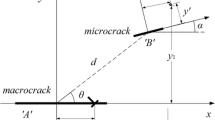Abstract
A plastic strain gradient theory incorporating the geometrically necessary dislocation density based on the low order displacement finite element method is proposed for calculation of the hardness value by Berkovich indentation. The obtained analysis results by this work are found to be in good agreement with the experimental data. Three-dimensional modeling technique of Berkovich indentation is also suggested. An empirical coefficient that includes the strain gradient effect into the yield stress formula is introduced and determined by reviewing area factors and hardness curves generated from the analyses. As pile-up occurs, classical plasticity theory gives a higher area factor and lower hardness value than those from experiment. However the strain gradient plasticity theory used in this work gives corrected area factor and hardness values. Dislocation density plots are generated that can explain the size effect during indentation and the availability of the three-dimensional modeling of Berkovich indentation.
Similar content being viewed by others
References
W. C. Oliver and G. M. Pharr, Improved technique for determining hardness and elastic modulus using load and displacement sensing indentation experiments, Journal of Materials Research 7(6) (1992) 1564–1580.
Q. Ma and D. R. Clarke, Size dependent hardness of silver single crystals. Journal of Materials Research 10(4) (1995) 853–863.
W. J. Poole, M. F. Ashby and N. A. Fleck, Micro-hardness of annealed and work-hardened copper polycrystals, Scripta Materialia 34(4) (1996) 559–564.
K. W. McElhaney, J. J. Vlassak and W. D. Nix, Determination of indenter tip geometry and indentation contact area for depth-sensing indentation experiments. Journal of Materials Research 13 (1998) 1300–1306.
H. Lee and J. H. Lee, Evaluation of material characteristics by micro/nano indentation tests, Transactions of the Korean Society of Mechanical Engineers A 32(10) (2008) 805–816.
B. M. Kim, C. J. Lee and J. M. Lee, Estimations of work hardening exponents of engineering metals using residual indentation profiles of nano-indentation, Journal of Mechanical Science and Technology 24 (2010) 73–76.
N. A. Fleck, G. M. Muller, M. F. Ashby and J. W. Hutchinson, Strain gradient plasticity: theory and experiment. Acta Metallurgica et Materialia 42 (1994) 475–487.
N. A. Fleck and J. W. Hutchinson, Strain gradient plasticity, Advances in Applied Mechanics 33 (1997) 295–361.
W. D. Nix and H. Gao, Indentation size effects in crystalline materials: a law for strain gradient plasticity, Journal of the Mechanics and Physics of Solids 46(3) (1998) 411–425.
H. Gao, Y. Huang, W. D. Nix and J. W. Hutchinson, Mechanism-based strain gradient plasticity — I. Theory, Journal of the Mechanics and Physics of Solids 47 (1999) 1239–1263.
N. A. Fleck and J. W. Hutchinson, A reformulation of strain gradient plasticity, Journal of the Mechanics and Physics of Solids 49 (2001) 2245–2271.
R. K. Abu Al-Rub and G. Z. Voyiadjis, A physically based gradient plasticity theory, International Journal of Plasticity 22(4) (2006) 654–684.
J. W. Kysar, Y. Saito, M. S. Oztop, D. Lee and W. T. Huh, Experimental lower bounds on geometrically necessary dislocation density, International Journal of Plasticity 26(8) (2010) 1097–1123.
M. S. Park, Y. S. Suh and S. Song, Modeling and analysis of size dependent structural problems by low order finite elements with strain gradient plasticity, Transactions of the Korean Society of Mechanical Engineers A 35(9) (2011) 1041–1050.
M. S. Park, Y. S. Suh and S. Song, On an implementation of the strain gradient plasticity with linear finite elements and reduced integration. Finite Elements in Analysis and Design 59 (2012) 35–43.
Y. Guo, Y. Huang, H. Gao, Z. Zhuang and K. C. Hwang, Taylor-based nonlocal theory of plasticity: Numerical studies of the micro-indentation experiments and crack tip fields, International Journal of Solids and Structures 38(42–43) (2001) 7447–7460.
M. S. Park and B. S. Kang, Gaussian kernel smoothing of explicit transient responses for drop-impact analysis, Transactions of the Korean Society of Mechanical Engineers A 35(3) (2011) 289–297.
W. B. Lee and Y. P. Chen, Simulation of micro-indentation hardness of FCC single crystals by mechanism-based strain gradient crystal plasticity, International Journal of Plasticity, 26(10) (2010) 1527–1540.
Author information
Authors and Affiliations
Corresponding author
Additional information
Recommended by Associate Editor Dae-Cheol Ko
Moon Shik Park received his B.S. degree (1987) from Hanyang University, and his M.S. (1989) and Ph.D. (1994) from Korea Advanced Institute of Science and Technology. He worked for Daewoo Heavy Industries and Boeing Commercial Airplane Group as an airplane structural engineer and designer. He was also the Dean of Academic Information Affairs Office and is currently a professor in the Department of Mechanical Engineering at Hannam University, Korea. His research interests include computational structural mechanics for design and analysis.
Yeong Sung Suh received his B.S. degree (1981) from Seoul National University, and his M.S. (1987) and Ph.D. (1990) from Rensselaer Polytechnic Institute (RPI), U.S.A. He was a postdoctoral researcher at both RPI and the Ohio State University. Currently he is the department chair in the department of mechanical engineering at Hannam University, Korea. His research interests include modeling and analysis of nonlinear material behavior in metal matrix composites and metal forming processes.
Rights and permissions
About this article
Cite this article
Park, M.S., Suh, Y.S. Hardness estimation for pile-up materials by strain gradient plasticity incorporating the geometrically necessary dislocation density. J Mech Sci Technol 27, 525–531 (2013). https://doi.org/10.1007/s12206-012-1243-4
Received:
Revised:
Accepted:
Published:
Issue Date:
DOI: https://doi.org/10.1007/s12206-012-1243-4




